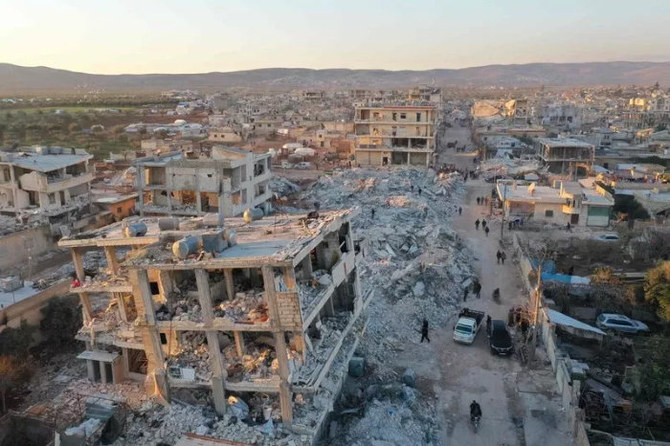Dr. Majid Rafizadeh
Socio-economic progress has been slow in Syria as the country still struggles with multiple challenges. Without a doubt, long-term civil wars, insecurity, and instability can set a nation back by inflicting damage on infrastructure and, more fundamentally, disrupt production and manufacturing processes.
Nevertheless, the Syrian government can still concentrate on four important issues to help the recovery process.
Firstly, it once again needs to introduce basic economic reforms. In terms of financial growth, one of the best periods in the country was the 1990s and into the 2000s, until the civil war broke out.
Prior to 1990, the economy was mainly state-controlled, and the government’s policy shifted toward gradual privatization, modernization, and the opening of the economy.
At the time, Syrian President Bashar Assad articulated the government’s new policy by stressing the need to modernize “the regulatory environment and the industrial base, activate and encourage the private sector, remove bureaucratic obstacles to investment, increase job opportunities, qualify cadres, improve education, and expand information technology.”
One lesson learned from the experience was that invigorating and helping advance the private sector could be critical to the economic growth of any nation.
Such a policy would help reduce inflation in Syria, reportedly at its highest-ever level.
To put it in perspective, the average inflation rate between 1957 and 2020 was running at around 14 percent. This year, inflation in Syria has reached 139 percent, higher than the rate in other troubled countries such as the Democratic Republic of the Congo, Angola, and Libya. Syria’s inflation rate is approximately 40 times higher than the average in nearby Arab Gulf states, meaning the country is currently experiencing hyperinflation.
But empowering the private sector requires that the government focuses on attracting foreign investment as well. This can be partially achieved by improving bilateral and multilateral ties with other nations in the region and beyond. Such a move would most likely have a significant impact on recovering the value of the Syrian currency.
The currency was trading at around 47 Syrian pounds to the dollar before the civil war began in 2011. At the start of this year, the rate was 7,000 pounds to the dollar, and on Nov. 21 it hit an all-time low of around 14,000 pounds to the dollar, meaning it had lost more than 50 percent of its value in less than a year.
One of the essential problems with the government’s prior modernization and privatization policy was that the opening of the economy only helped specific groups of people, while increasing wealth inequality and socioeconomic disparity in society. This mainly occurred due to widespread corruption, unequal distribution of wealth, and general mismanagement.
It is another important lesson for the Syrian government to learn — that modernization of the economy should be accompanied with fighting financial corruption.
The second priority of the government should be to take steps to enhance its legitimacy inside Syria and abroad.
One effective approach would be to introduce a long-term vision for the country with social, civil, political, and security reforms that encouraged inclusiveness. It should include holding accountable those governmental or non-governmental agencies that violated the rule of law.
For instance, the UN’s top court, the International Court of Justice, ordered the Syrian government to take action to prevent torture. The court’s president, Joan Donoghue, said the UN panel was ordering the Syrian government to, “take all measures within its power to prevent acts of torture and other cruel, inhuman, or degrading treatment or punishment.”
Establishing safety nets and social protection mechanisms are critical too.
The third key issue for the government to prioritize was addressing the threat of drug trafficking to the Syrian people and the region, a problem that can quickly undermine the social, economic, and political stability of countries and subsequently lead to an increase in similar crimes. The issue can become even more threatening, particularly in nations that have a large youth population such as Syria and other Arab countries.
To tackle the threat, the Syrian government must work with other nations to track down and dismantle groups involved in the production and smuggling of illegal drugs. Such a move could offer Damascus advantages such as stronger economic ties and increased trade with neighboring countries.
Damascus must also get involved in intelligence sharing with other governments as an effective way to address the narcotics threat. Another step would be to disrupt the flow of funds to drug traffickers in Syria. Countries such as the UAE and Saudi Arabia have strong capabilities when it comes to law enforcement, intelligence, and security.
Finally, the fourth important issue for the Syrian government to deal with was to gather international and global support for the rebuilding and reconstruction of the country.
The protracted civil war has caused significant damage to the country’s infrastructure and economy. The reconstruction cost for Syria has been estimated at almost $1.2 trillion, meaning that Damascus will need foreign financial assistance.
Actions to reconstruct and rebuild Syria would improve the living standards of the Syrian people, create jobs, enhance stability, and address the widespread poverty throughout the country.
In a nutshell, some of the critical issues that the Syrian government must focus on include introducing economic and political reforms, stopping drug trafficking, and gathering and mobilizing international support for the rebuilding and reconstruction of the country’s infrastructure.







